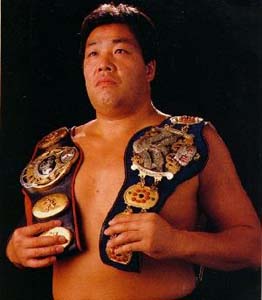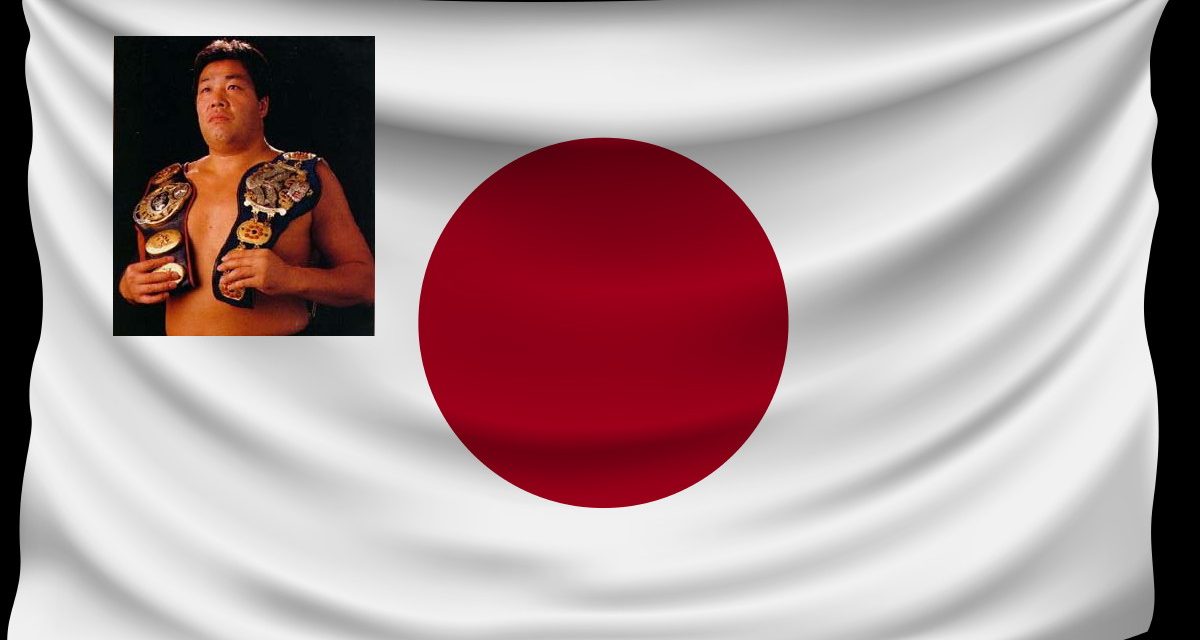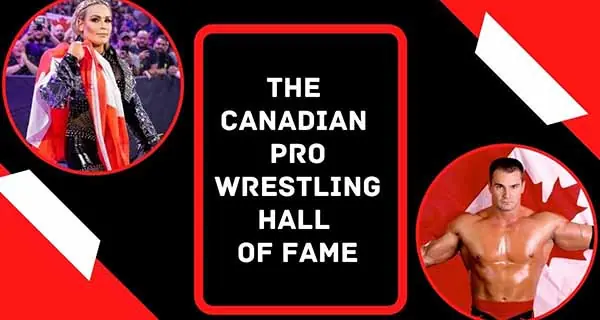Tomomi “Jumbo” Tsuruta was perhaps the best wrestler ever in the 28-year history of All Japan Pro Wrestling. The Japanese legend Tsuruta, who died this past weekend in the Philippines from kidney failure, was not only one of the most decorated heavyweights in Japan, but also one of the most beloved.
Classy. Personable. Genuine. A true friend.

That’s how his colleagues remember him. That’s his true legacy.
“All morning the phone has been ringing off the hook. I just couldn’t believe it,” Dory Funk Jr. told SLAM! Wrestling this afternoon over the phone from his home in Ocala, Florida.
Funk remembers the former All Japan Triple Crown Champion as a terrific wrestler that never took his athletic gifts for granted.
“(He had) a super attitude, he was very friendly to everybody, cared for everybody, cared how they were. He was such a surprisingly nice guy for such a great athlete. He was a Greco-Roman amateur wrestler in the Olympics. He was also a basketball player and competitive swimmer in Japan. He was a real all-around real athlete.”
Funk, a former NWA World Heavyweight champion, was a regular with All Japan for twenty years and has helped train hundreds of wrestlers, including Tsuruta, for their pro debut.
“I first met him in 1972. He was participating in the Olympics in Munich and he was signed on by All Japan Pro Wrestling and was sent to Amarillo, Texas to be trained by me. His first match was in Amarillo (a territory that Funk owned and booked) at the TV studio so I was there for his first match. For the next six months we trained in Amarillo, I thought he was the best Japanese wrestler in America at the time. He was my best student.”
After training with Funk, Tsuruta worked several territories in the States, learning the wrestling ropes and preparing for his eventual return to Japan. At the time, most promoters in the U.S. portrayed Japanese wrestlers as stereotypical, salt-throwing, wave flagging heels who vowed allegiance to the Emperor.
Tsuruta was the exception.
“He was the only Japanese wrestler that I knew that was really well accepted as a good guy here in America,” stated Funk. “All the fans really liked him. People just liked him over here. He worked for me in Amarillo and when I was booking in Florida and when I was in Mid Atlantic, he was accepted very well in each place as a babyface. That’s at a time when all the Japanese were working as heels over here.”
“I go way back with him. When he came to the United States under the tutelage basically of the Funk brothers, Dory and Terry, one of the first places he came was to what was then the Amarillo territory in Texas,” recalled Ted DiBiase.
“I was still a student at West Texas State University playing football. Gosh, I was just a kid. I was like 18, 19 years old. He had already been to the Olympics and was the rising star for All Japan Pro Wrestling. He and I just hit it off and developed a friendship. I worked out in the ring with him a couple of times even then. He showed me a few things. [laughing] Of course, then he went back to Japan and became one of the biggest stars for All Japan Pro Wrestling, one of the biggest stars in Japan during his prime.”
“I travelled back to Japan on his first tour back when he went back home and he did a terrific job,” recalled Funk. “He was the best. He was a legit wrestler. The style that I took over to Japan was very popular and he learned from me and could do anything I could do. He was one of the (first) wrestlers here to bring in a more action style. He was terrific.”
Harley Race also met Tsuruta shortly after the 1972 Munich Olympics. “Jumbo was an all-around great athlete, that’s for sure,” he said.
Tsuruta’s in ring work ethic and style of wrestling earned him the respect of wrestlers from around the globe.
“I wrestled Jumbo many times,” recalled Rick Martel, a former AWA World Heavyweight champion who defeated Tsuruta for the title in 1984. “I’m sad because I liked him a lot. I respected him. I had many matches against him. This guy always gave 100%.”
“Jumbo was a big guy, but he could move for his size,” Martel continued. “He was really good, everything he did looked good. He was in great shape also, could go on. I wrestled him a few times where they were one-hour matches and he was as good at the beginning as at the end of the sixty minutes.”
“I worked with him quite a few times actually,” said Johnny Smith, a current All Japan Pro Wrestling star who is set to return to Japan on Thursday for another tour. “He was a stand up guy, he took pride in his wrestling work. There were no free rides with him. You had to earn your stripes with him.”
“It’s a big loss not only to All Japan but to the Japanese people. He was a superstar. It’s a tragic loss.”
Despite being one of the top stars in Japan, Tsuruta never forgot his roots, and was always more than willing to help out younger wrestlers.
“He was a great guy. He would have time for you, he’d help you out,” stated Smith. “He was definitely a classy guy. He had a lot of respect for the business and for himself.”
“When I came to Japan and I was a visitor in his country,” remembered DiBiase, “he was one of the first to come and renew that friendship and basically take me out and show me around, making sure that my needs were being met. (He was) just a nice guy basically. I couldn’t say enough good things about him.”
More than anything else, Tsuruta will be remembered for the pride he took in is work.
“I remember I wrestled him in small towns in Japan,” said Martel. “He’d wrestle the same in small towns as in front of 30,000 people in Tokyo. He was that kind of guy.”
“In the ring, he helped me get established as someone who was strong,” stated DiBiase. “He showed me the ropes in Japan. He broke the mould, so to speak. He wrestled more of an American-tradition style and actually won the hearts of the Japanese.”
Tsuruta may be gone, but he’s left behind a lot of fond memories.
“I remember they did a parallel between him and I because I went to Japan I brought my wife with me” said Martel. “We had our honeymoon there. I had to defend my title against him. … He was also in the process of getting married. I remember the magazines would show him in his house with his new wife and then they’d show me and my wife in our house. We kind of laughed at that the one time he showed me the magazine.”
“A couple of tours ago we were in a bar having a meal and a few drinks,” recalled Smith. “There was a TV with wrestling showing some old tapes of Jumbo. I was watching them and everybody said how believable his style was and how much respect he warranted.”
“The first time he came to America we were going downtown,” remembered Funk. “I put him in my car and tried to show him how to drive and he nearly wrecked the car. [laughing] He always drove on the other side of the road (in Japan). I just had a lot of fun with him, I really enjoyed being around him. During his first five years in the wrestling business I was around him an awful lot as a partner and opponent in Japan, Puerto Rico, Florida and Mid Atlantic. He was always a friend, always somebody I could call on.”
— with files from Greg Oliver
RELATED LINKS
- May 27, 2000: Jumbo Tsuruta memorial planned
- May 18, 2000: Editorial: Tsuruta the best ever from Japan
- May 17, 2000: Jumbo, Baba and The Destroyer
- May 16, 2000: Jumbo Tsuruta dies of kidney failure


